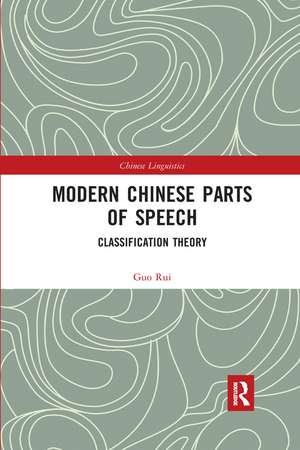Modern Chinese Parts of Speech: Classification Theory: Chinese Linguistics
Autor Guo Ruien Limba Engleză Paperback – 30 sep 2020
The classification of parts of speech in Chinese is a tough job due to the language's lack of morphological differences. Based on the analysis of nearly 40,000 Chinese characters, this book proposes that, essentially, a part of speech is not of distributional type and that its intrinsic basis is an expressional function and the semantic type. Essentially, large categories such as substantive words, predicate words and modification words are classes of words classified according to their expressional functions. Basic categories such as nouns, verbs and adjectives are classes that combine semantic types with syntactical functions. In classifying parts of speech, the book pays attention not to identifying a single distributive characteristic that is internally universal and externally exclusive but to clustering the grammatical functions that have the same classification value through the “reflection-representation” relationship among distribution, expressional function and semantic type (distribution reflects expressional function and semantic type, which are, in turn, represented as distribution), thereby identifying the classification criteria. It uses distributional compatibility and the correlation principle to analyze which distributional differences represent differences in parts of speech and which do not. In this way, grammatical functions that have equal classification values are collected into one equivalent function cluster, each of which represents one part of speech. The book uses four strategies to classify parts of speech, namely the homogeneity strategy, the homomorphical strategy, the priority homomorphical strategy and the consolidation strategy. It will be a valuable reference for Chinese linguistic researchers and students as well as Chinese learners.
| Toate formatele și edițiile | Preț | Express |
|---|---|---|
| Paperback (2) | 278.30 lei 43-57 zile | |
| Taylor & Francis – 30 sep 2020 | 278.30 lei 43-57 zile | |
| Taylor & Francis – 14 aug 2020 | 387.75 lei 43-57 zile | |
| Hardback (2) | 1004.38 lei 43-57 zile | |
| Taylor & Francis – 26 feb 2019 | 1004.38 lei 43-57 zile | |
| Taylor & Francis – 27 iun 2018 | 1109.18 lei 43-57 zile |
Din seria Chinese Linguistics
- 8%
 Preț: 567.49 lei
Preț: 567.49 lei -
 Preț: 311.18 lei
Preț: 311.18 lei -
 Preț: 322.64 lei
Preț: 322.64 lei -
 Preț: 310.80 lei
Preț: 310.80 lei -
 Preț: 310.14 lei
Preț: 310.14 lei -
 Preț: 324.84 lei
Preț: 324.84 lei - 17%
 Preț: 259.98 lei
Preț: 259.98 lei - 34%
 Preț: 708.55 lei
Preț: 708.55 lei -
 Preț: 312.75 lei
Preț: 312.75 lei -
 Preț: 328.25 lei
Preț: 328.25 lei -
 Preț: 307.47 lei
Preț: 307.47 lei - 20%
 Preț: 259.98 lei
Preț: 259.98 lei - 34%
 Preț: 709.29 lei
Preț: 709.29 lei - 18%
 Preț: 901.35 lei
Preț: 901.35 lei - 36%
 Preț: 714.92 lei
Preț: 714.92 lei - 20%
 Preț: 259.98 lei
Preț: 259.98 lei - 17%
 Preț: 240.24 lei
Preț: 240.24 lei - 17%
 Preț: 257.41 lei
Preț: 257.41 lei - 17%
 Preț: 259.98 lei
Preț: 259.98 lei - 18%
 Preț: 1000.27 lei
Preț: 1000.27 lei -
 Preț: 319.59 lei
Preț: 319.59 lei - 34%
 Preț: 5652.10 lei
Preț: 5652.10 lei - 34%
 Preț: 708.88 lei
Preț: 708.88 lei - 18%
 Preț: 1334.28 lei
Preț: 1334.28 lei - 18%
 Preț: 1016.20 lei
Preț: 1016.20 lei - 31%
 Preț: 1693.29 lei
Preț: 1693.29 lei - 33%
 Preț: 713.60 lei
Preț: 713.60 lei - 18%
 Preț: 1000.27 lei
Preț: 1000.27 lei - 18%
 Preț: 1000.27 lei
Preț: 1000.27 lei
Preț: 278.30 lei
Preț vechi: 344.64 lei
-19% Nou
Puncte Express: 417
Preț estimativ în valută:
53.25€ • 55.75$ • 44.06£
53.25€ • 55.75$ • 44.06£
Carte tipărită la comandă
Livrare economică 07-21 aprilie
Preluare comenzi: 021 569.72.76
Specificații
ISBN-13: 9780367661076
ISBN-10: 0367661071
Pagini: 224
Dimensiuni: 156 x 234 x 24 mm
Greutate: 0.74 kg
Ediția:1
Editura: Taylor & Francis
Colecția Routledge
Seria Chinese Linguistics
Locul publicării:Oxford, United Kingdom
ISBN-10: 0367661071
Pagini: 224
Dimensiuni: 156 x 234 x 24 mm
Greutate: 0.74 kg
Ediția:1
Editura: Taylor & Francis
Colecția Routledge
Seria Chinese Linguistics
Locul publicării:Oxford, United Kingdom
Public țintă
Postgraduate, Professional, and UndergraduateCuprins
Foreword to the Chinese edition
List of figures
List of tables
Chapter One: Introduction
Chapter Two: Basic issues concerning classification of parts of speech
Chapter Three: Possibilities and purposes of classifying parts of speech
Chapter Four: Essence and expressional functions of a part of speech
Chapter Five: Criteria for classifying parts of speech
Chapter Six: How to classify parts of speech according to distribution
Chapter Seven: Conversional words and nominalization
Chapter Eight: Conclusions
Bibliography
Index
List of figures
List of tables
Chapter One: Introduction
Chapter Two: Basic issues concerning classification of parts of speech
Chapter Three: Possibilities and purposes of classifying parts of speech
Chapter Four: Essence and expressional functions of a part of speech
Chapter Five: Criteria for classifying parts of speech
Chapter Six: How to classify parts of speech according to distribution
Chapter Seven: Conversional words and nominalization
Chapter Eight: Conclusions
Bibliography
Index
Notă biografică
Guo Rui is a professor in the Department of Chinese Language and Literature, Peking University. His main research lies in Chinese grammar and semantics.
Descriere
The book uses four strategies to divide parts of speech, namely homogeneity strategy, homomorphical strategy, priority homomorphical strategy and consolidation strategy. It may be a valuable reference for Chinese linguistic researchers and students as well as Chinese learners.
